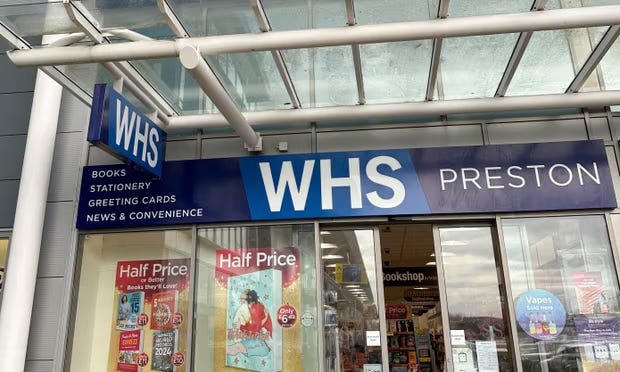Firstly, a very Happy New Year to all of the Moving Tribes gang and welcome to 2024. Here at MT towers we have plenty lined up for the next few months, and I’m sure the retail and hospitality sectors will combine to give us plenty to talk about and learn from.
One UK retail story which seems to have created a disproportionate amount of heat and light over the last week or so has been coverage of what appears to be a test being run by WH Smith of a new logo and brand-look. A good example of the coverage is the article at the Guardian:
In the few days since all this coverage emerged, the story has lived what feels like a full internet life-cycle. First was the wave of condemnation of what does indeed look like a really terrible rebrand. Then came the redoubtable Mark Ritson on LinkedIn telling everyone to calm down, that it was just a test and showed how scientific WH Smith were being in their approach. Then in turn came all the comments telling Mark the many ways he was wrong about that, including the memorable turn of phrase that “we don’t stick our hand in a blender to see what would happen”.
All good fun, but reading it all I got to wondering about something a bit more fundamental - how sometimes companies can go a bit ‘snow blind’ in their choices about how they present themselves.
There’s an example from my own career that springs to mind. Before I joined Odeon Cinemas as CCO, I naturally spent a bit of time looking at the websites for the various territory operations, and on the UK website I found something a bit odd. The business operated a loyalty scheme and in the section explaining what I could do with the loyalty points I’d earned there was a table with the obvious “free popcorn” and “free cinema ticket” options.
But down at the bottom of the table was the promise that, if I was really loyal and earned loads of points, I could cash a big chunk of them in for “OLS tickets”.
The only problem, as you’ve probably spotted, was that I had absolutely no idea what an OLS was.
Only on arriving in the office and asking did it become apparent that OLS stood for Odeon Leicester Square - the flagship cinema on the estate, the home of movie premieres and an undoubtedly exciting place to visit.
How then, rather than the web equivalent of trumpet fanfares and soaring searchlights, had the team in the business decided to hide this fantastic customer offering behind 3 boring initials? Even for those customers smarter than me who decoded the abbreviation, this was by any measure an epic piece of under-selling.
The answer became obvious very quickly. Absolutely everyone inside the business referred to the Leicester Square cinema by the OLS abbreviation. That made perfect sense, as everyone knew what it meant.
You can see the problem - this internal language had leaked across into external communication, despite the fact that no customer in the 90-odd years the cinema had operated had ever looked at their partner and said “Let’s go for a night out at OLS”. What was sensible shorthand internally turned into terrible customer communication. It had been signed off, though, by layers of people to whom the language made perfect sense but who failed to appreciate that it didn’t work externally.
I’m a huge admirer of WH Smith, despite all the (largely justified) criticism it gets for store standards and under-staffing. It has survived very much against the odds and has done so on the back of a fiercely commercial strategy that has focussed on becoming ‘last retailer standing’ in a number of key categories and protecting margins by doing so. Whatever you think of the business, its survival contains lessons for anyone in retail.
I do wonder, though, whether this rebrand experiment (test or not) tells me that something similar has happened in the business as I saw at Odeon. After all, there are strong parallels. I’d place a confident bet that up and down the country customers refer to the brand as either “WH Smiths” or “Smiths” and that none of them ever calls it “WHS”.
In the industry, however, it is completely routine for people talking about the high street to refer to the business as WHS - just like in the Odeon scenario, it is an abbreviation that makes sense when you are talking to others ‘in the know’ but equally one that makes no sense when talking to customers.
I have no idea whether the business is about to roll out thousands of pig-ugly fascias like the one pictured above, or whether it was a test or even just a PR stunt.
But I do know this - the danger of ‘internal’, ‘in-the-know’ language leaking out into the way we market to our customers is ever-present. Whether it is acronyms like the ones we’ve talked about here, or industry terminology that most customers don’t understand it isn’t difficult to find examples. I don’t know an OLED television from a QLED one, and if your marketing strategy relies on me being bothered to find out then you are making life too hard for yourself.
Take a look around your own business, and see if you can spot where the terminology has escaped into the wild. You might just be surprised at what you find.
See you next week, when we may even have started to see this year’s crop of Christmas trading results, which I’ll remind you we proved a few months ago right here on Moving Tribes represents the single worst possible predictor of future success!




